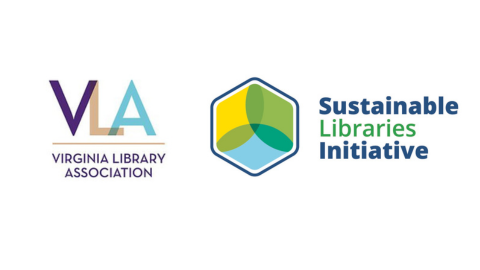Published on October 9, 2024
Sustainable Libraries Initiative partners with the Virginia Library Association
The Sustainable Libraries Initiative partners with the Virginia Library Association to cultivate library leadership for community resilience
New York–October 9, 2024 - A new partnership between the Sustainable Libraries Initiative (SLI) and the Virginia Library Association (VLA) aims to equip VLA members with tools and resources to address the challenges and mitigate the impact of climate change in their communities.
Through this partnership, VLA members will join a nationwide community of practice who are using tools created or compiled by the SLI and its members to uncover ways that their libraries and communities will understand, adapt to, and help lessen the effects of climate change. These tools include policy and programming examples; a vendor list to ease the search of finding environmentally friendly products and services; a webinar archive and the Road Map to Sustainability to help with planning; and a custom CO2 calculator to help members estimate their current institutional greenhouse gas (GHG) emissions and measure longitudinal progress in efforts to reduce their emissions.
“The Virginia Library Association is thrilled to partner with the Sustainable Libraries Initiative, emphasizing sustainability as a core value for our profession and ensuring accessibility to the program. Any library with a VLA Affiliate Membership is eligible; if your library is not an Affiliate but has Individuals with VLA memberships, those libraries can also participate. With more than 94 Affiliate Libraries and 5100+ members, we anticipate wide response and enthusiasm for this Member Benefit.” said Lisa R. Varga, Executive Director of the Virginia Library Association.
“We applaud the Virginia Library Association for seeking this partnership to enable all of their members to accelerate their adoption of sustainable thinking,” said Rebekkah Smith Aldrich, Board President of the Sustainable Libraries Initiative, “Positioning the Virginia library community as leaders in the conversation about climate change mitigation and adaptation is a strong move to ensure libraries contribute to their community’s resilience and remain relevant and responsive institutions.”
The Sustainable Libraries Initiative’s Sustainable Library Certification Program (SLCP) — available to public libraries, academic libraries, library systems, and school librarians — provides libraries with a reliable course of action to enhance library leadership and demonstrate commitment to environmental stewardship, economic feasibility, and social equity. The certification program guides participants to evaluate their decision-making philosophies, build stronger connections within their community, and consider the lasting impacts of their action for their service area.
Members of the Virginia Library Association who opt in via the SLI website will receive one free year of annual membership to the Sustainable Libraries Initiative and a 20% discount on the award-winning Sustainable Library Certification Program. Cohorts of five or more libraries will receive a 25% discount on certification, supporting the principle that there is power in collective action.
About the Sustainable Libraries Initiative
The Sustainable Libraries Initiative is a member-driven organization that empowers library professionals to be leaders using triple-bottom-line sustainability (environmental stewardship, social equity, and economic feasibility) throughout their organizations and in their communities. The Sustainable Library Certification Program is now enrolling public and academic libraries, library systems, and school librarians nationwide.
About the Virginia Library Association
The purpose of the Virginia Library Association is to develop, promote, and improve library and information services, library staff, and the profession of librarianship in order to advance literacy and learning and to ensure access to information in the Commonwealth of Virginia. Since its founding in 1905, VLA has grown in number; expanded the scope of its organization; engaged legislatively at the state and federal level; provided its members with newsletters, scholarly journals, and a website; and supported library education, training, and outreach.
